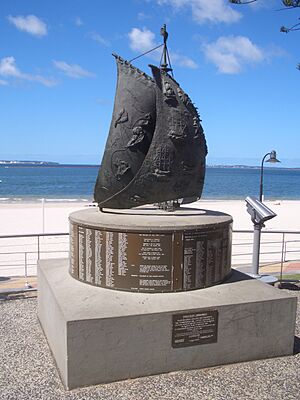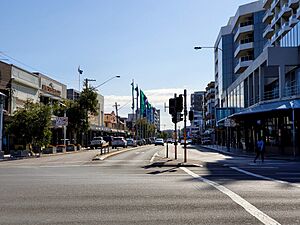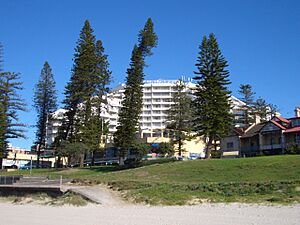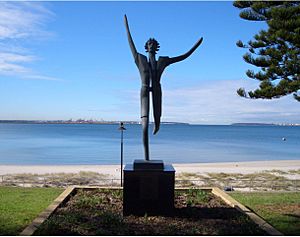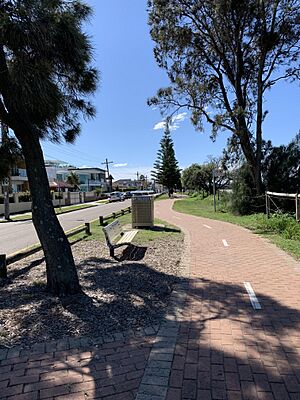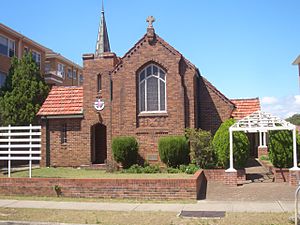Brighton-Le-Sands, New South Wales facts for kids
Quick facts for kids Brighton Le SandsSydney, New South Wales |
|||||||||||||||
|---|---|---|---|---|---|---|---|---|---|---|---|---|---|---|---|
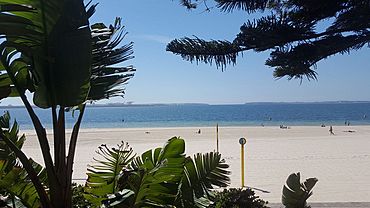
Brighton Beach
|
|||||||||||||||
| Population | 8,325 (2016 census) | ||||||||||||||
| Postcode(s) | 2216 | ||||||||||||||
| Elevation | 11 m (36 ft) | ||||||||||||||
| Location | 13 km (8 mi) SSW of Sydney CBD | ||||||||||||||
| LGA(s) | Bayside Council | ||||||||||||||
| State electorate(s) | Rockdale | ||||||||||||||
| Federal Division(s) | Barton | ||||||||||||||
|
|||||||||||||||
Brighton Le Sands, also known as Brighton or Brighton Beach, is a fun suburb in southern Sydney, New South Wales, Australia. It's about 13 kilometers south of the Sydney city center. You'll find it right on the western shore of Botany Bay. Brighton Le Sands is part of the Bayside Council area.
Lady Robinsons Beach and Cook Park stretch along the eastern side of Brighton Le Sands, next to Botany Bay. People often call this beach Brighton Beach. It's famous for its light-colored sand. Brighton Le Sands has a mix of different homes, from houses to apartments. It also has lots of shops, cafes, and restaurants. The Grand Parade road runs along the beach, and Bay Street is where many businesses are.
Contents
History of Brighton Le Sands
The area between the Cooks River and Georges River was first called Seven Mile Beach. In 1874, its name changed to Lady Robinsons Beach. This was to honor the wife of Governor Sir Hercules Robinson. Cook Park was created around 1882. It's a strip of land about 30 meters from the ocean. The park is named after Samuel Cook, who wanted it to be a public place for everyone to enjoy.
A man named Thomas Saywell had big plans for this area. He wanted to make it like the famous seaside town of Brighton in England. So, he named his new housing area New Brighton. Not much happened in Brighton Le Sands until a railway opened to Rockdale in 1884. In 1885, Thomas Saywell built a tramway from Rockdale to Lady Robinsons Beach. This tram line went along Bay Street.
Thomas Saywell also built public swimming baths, a large picnic spot called Shady Nook Recreational Park, a race course, and the Brighton Hotel. These projects were very successful! To avoid confusion with Brighton in England, the area became known as Brighton-le-Sands. The tramway became electric in 1900. It closed in 1949, and buses took over the route.
The Brighton Baths were very popular with people looking for a weekend getaway from Sydney. The racecourse was open from about 1897 to 1911. The baths were also a great place to cool off after a day at the races.
The Brighton Hotel changed its purpose in 1892. Thomas Saywell offered the hotel to The Scots College. The college used the building for classrooms and dorms. In 1895, the college moved to Bellevue Hill. This was because the nearby racecourse and beach were distracting the students.
By 1900, there were fun parks south of Bay Street, plus a pony racetrack. More homes were built in the area before World War I. Even more development happened after World War I, in the late 1920s and 1950s. For the first 20 years of the 1900s, a small boat offered ferry rides around Botany Bay. Brighton Le Sands was an important stop.
In 1966, a huge storm hit the coast. It destroyed the baths and much of the beach. Also, expanding Sydney Airport and Port Botany involved digging sand from the bay. This messed up the natural sand flow and caused serious damage. Today, projects are trying to fix the beach and coastline.
Shopping and Food
The main shopping area is on Bay Street. It goes all the way to the beach on The Grand Parade. The big Novotel Hotel Brighton Beach is a landmark here. It also has many shops and businesses inside.
You'll find lots of cafes and restaurants along The Grand Parade and Bay Street. They offer many types of food, like Australian, Greek, French, Italian, Thai, and Japanese. There are also plenty of take-away food shops. You can get seafood, chicken, cakes, and gelato (ice cream). Other shops include a supermarket, banks, a post office, clothing stores, and more.
In the late 1990s, a Coles supermarket opened on Moate Avenue. This changed some of the smaller local shops. The area is planning more upgrades as part of a big project called "Destinations Rockdale."
Getting Around
There's a bus service that connects Brighton Le Sands to Rockdale railway station. This means many people take a bus to get to the train station. Transit Systems runs all the bus routes in the area.
- Route 303 goes from Sans Souci to Randwick. It passes through Brighton-le-Sands and Mascot.
- Route 478 goes from Westfield Miranda to Rockdale railway station. It travels through Ramsgate and Brighton Le Sands.
- Route 479 goes from Rockdale Plaza to Kyeemagh and Brighton-Le-Sands, via Rockdale railway station.
Long ago, starting in 1903, a weekend ferry service connected Brighton-le-Sands with other places like Kurnell and La Perouse.
Cool Places to See
Brighton Le Sands has many interesting spots:
- Lady Robinsons Beach and Brighton Le Sands Baths
- Cook Park, White Oak Reserve, CA Redmond Field Memorial Playing Fields, Tony Baker Reserve, Bicentennial Park East
- Several churches: Bayside Church, St Thomas More Catholic Church, St Andrews Uniting Church, St Marks Anglican Church
- Brighton Le Sands Primary School
- Brighton Le Sands Library (Bayside Library)
Culture and Fun
Entertainment
Brighton Le Sands is a popular place for different kinds of food and fun at night. Many people call it 'Little Greece by the Bay'. This is because it has so many Greek cafes, restaurants, and businesses. You can find them right on the beach side of The Grand Parade, looking out at the sand and boardwalk.
The area was a big party spot when Greece won the Euro 2004 Football (soccer) Cup. Bay Street was even closed at night, and a huge screen was set up during the Athens 2004 Summer Olympics.
Attractions
Brighton Le Sands is home to the Bicentennial Monument. It stands in Cook Park, by Botany Bay. This monument remembers when the First Fleet arrived in Botany Bay in 1788.
The Greek Australian Sports Hall of Fame was created to celebrate the Athens 2004 Summer Olympics. It used to be in an old building on The Grande Parade. Now it's moved further south. A statue of Spyros Louis, a Greek gold medalist from 1896, is also nearby in Cook Park.
A paved walkway and cycleway runs along Cook Park. It stretches about 7 kilometers from Kyeemagh to Sandringham. It's a great place for walking, jogging, and cycling, especially on weekends. Cyclists can connect to other routes from here.
Every New Year's Eve, Bayside Council puts on a popular family fireworks show over the water at 9pm. Lots of people come to Brighton Beach to watch!
Famous People
- Michael Dransfield, a poet, grew up in Brighton Le Sands.
- June Salter, an actress, also grew up here and went to the local primary school.
Population
The 2021 Australian Census found that 8,336 people live in Brighton Le Sands. About 51% of people were born in Australia. Other common birthplaces include Greece (5.0%), Egypt (2.7%), and Brazil (2.5%).
About 45% of people speak only English at home. Other languages spoken include Greek (12.1%), Arabic (6.6%), and Spanish (3.8%). The most common religions are Catholic (24.4%), Eastern Orthodox (21.9%), and No Religion (18.1%).
Brighton Le Sands is popular with young people and singles. They enjoy the beach and fun lifestyle. The suburb is known for its large Greek-Australian community, which you can see in many local businesses.
Brighton Le Sands Primary School
The first school building opened in 1917. It was on Crawford Road. As more people moved to the suburb, new buildings were added in the 1930s. These included an infants' school for younger students and a main school for older primary students.
Images for kids


